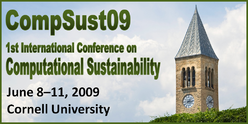- Computational Sustainability
-
Computational Sustainability is an interdisciplinary field [1] [2] that aims to apply techniques from computer science, information science, operations research, applied mathematics, and statistics for balancing environmental, economic, and societal needs for sustainable development. The main focus is on developing computational and mathematical models and methods for decision making concerning the management and allocation of resources in order to help solve some of the most challenging problems related to sustainability.
Computational sustainability problems are unique in scale, impact, complexity, and richness, often involving combinatorial decisions, in a highly dynamic and uncertain environment. The research pursued is inherently highly interdisciplinary, bringing together computer scientists, applied mathematicians, statisticians, biologists, environmental scientists, biological and environmental engineers, and economists.
Contents
Related events
- AAAI-11-CompSust : Special Track on Computational Sustainability and Artificial Intelligence during the Twenty-Fifth AAAI Conference on Artificial Intelligence held August 7–11, 2011 in San Francisco.
- CompSust'10 Conference: 2nd International Conference on Computational Sustainability, Massachusetts Institute of Technology (MIT), Cambridge MA, June 28-30, 2010.
- CompSust09 Conference: 1st International Conference on Computational Sustainability, Cornell University, Ithaca NY, June 8-11, 2009.
- CROCS at CP-10: 3rd International Workshop on Constraint Reasoning and Optimization for Computational Sustainability, St. Andrews, Scotland, September 6, 2010.
- CROCS at CPAIOR-10: 2nd International Workshop on Constraint Reasoning and Optimization for Computational Sustainability, Bologna, Italy, June 15, 2010.
- CROCS-09: 1st International Workshop on Constraint Reasoning and Optimization for Computational Sustainability, Lisbon, Portugal, September 20, 2009.
See also
- Institute for Computational Sustainability (ICS)
- eBird
- The Nature Conservancy
- USFWS
- USGS
External links
References
- ^ Gomes, Carla P. (Dec 2009). "Computational Sustainability: Computational methods for a sustainable environment, economy, and society". The Bridge, National Academy of Engineering 39 (4).
- ^ Frankel, Karen A. (Sep 2009). "Computer Science Meets Environmental Science: Scientists share knowledge and seek collaborators at computational sustainability conference". Communications of the ACM 52 (9): 23. doi:10.1145/1562164.1562174.
3. ^Murgante B., Borruso G., Lapucci A. (2011) “Geocomputation, Sustainability and Environmental Planning” Studies in Computational Intelligence , Vol. 348. Springer-Verlag, Berlin
Categories:
Wikimedia Foundation. 2010.


